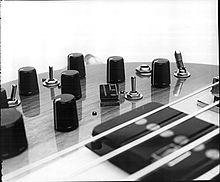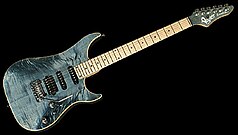 | |
| Company type | Ltd., SARL |
|---|---|
| Industry | Musical instruments |
| Founded | 1980; 44 years ago (1980) |
| Founder | Patrice Vigier |
| Headquarters | Grigny, Essonne, France |
| Area served | Worldwide |
| Key people | Patrice Vigier, DJ Scully, Ben Whatsley |
| Products | Electric guitars , basses, strings |
| Parent | self-owned |
| Divisions | High Tech Distribution |
| Website | vigierguitars.com |
Vigier Guitars is a French musical instruments company based in Grigny, Essonne and founded by Patrice Vigier in 1980. In addition to manufacturing, the company is also active in the import and wholesale distribution of musical instruments, amplifiers and accessories through its division High Tech Distribution.
The company manufactures electric guitars, basses, and strings.
History
Patrice Vigier, a self-taught luthier from les Ulis, began modifying guitars and building finished necks at the end of the 1970s. He later built his first fretless guitar with a glass fingerboard. Through a friend, Philippe Lacour of Distribution Music, Vigier met his first customers in Montparnasse. In 1980, he founded the company, Vigier, and introduced his first model, the Arpege, at a music fair. That guitar featured:
- Neck-through construction with a trapezoidal extension
- Metal reinforcement board underneath the fingerboard
- Metal fretboard on the fretless version
- Active electronics
- A fixed bridge
- Benedetti custom humbuckers

In 1981, instead of using standard batteries, Vigier powered its electronics with a rechargeable power supply. In 1983, another model came equipped with a built-in equalizer and sound memory system called Nautilus. Vigier launched two other models: the Passion in 1983 and the Marilyn in 1985. In 1986, Vigier diversified by creating a wholesale division to import and distribute instruments, amplifiers, and accessories. Distributed brands included Ampeg, DiMarzio, Ernie Ball, Music Man, Orange, Premier, and Trace Elliot. Two years later, Vigier renamed the division High Tech Distribution to separate the manufacturing and distribution operations. In the 1990s, Vigier introduced new models. The Excalibur came in 1991, its fretless variant, the Surfreter in 1998, and the Excess bass in 1996.
In 2000, Vigier celebrated its 20th anniversary with an Excalibur Surfreter adorned with gold, diamonds, sapphires, and emeralds. The instrument was valued at EUR 30,000. In the same year, the company launched the Expert, a model inspired by the classic Fender Stratocaster. Vigier also developed a guitar with a MIDI-controlled selector, volume, and tone knob. The company presented a prototype at the 2003 Frankfurt music fair, but never finalized the project as Patrice Vigier never approved the final version. In the second half of the 2000s, Vigier began introducing signature models—including the Excalibur Shawn Lane in 2005, and the Excalibur Bumblefoot Ron Thal and Excess Roger Glover in 2006. In 2009 Vigier introduced its model singlecut, G.V., in reference to Georges Vigier, Patrice's late father.
Models
Electric guitars
 Fretless guitar
Fretless guitar Excalibur Ultra Blues
Excalibur Ultra Blues
- Arpege
- Passion
- Excalibur
- G.V.
- Expert
- Marilyn
- Bfoot
- DoubleBfoot
Basses
- Arpege
- Excess
- Passion
Manufacturing
Vigier produces all their instruments in France. Vigier makes each guitar or bass in three to five months—partly by hand and partly with machines. Woods—such as alder, maple, and ash—come from French forests. Rosewood and mahogany are imported from India and Honduras respectively. Pre-cut raw wood logs are sorted and dried naturally for three to seven years to achieve the desired moisture content. Bodies and necks are drawn on the blanks using templates—then cut, dried, and stored in a controlled environment. In addition to wood, Vigier uses other materials such as copper and steel alloys (Delta metal and iMetal) and Phenowood, a resin-based composite material.
Vigier builds bodies from two pieces. They machine cuts and bevels with CNC tools, and make fingerboards corrected to within 1/100 of a millimeter. The necks are fitted with the 90/10 design (90% wood, 10% carbon) whereby a carbon reinforcement bar replaces an adjustable truss rod. They do the rest of the operations by hand. Instrument weight is maintained between 3 and 3.7 kg. Instruments are hand finished with about ten layers of stain and clear coat to a thickness of approximately 0.7 mm. Glue and finish are dried for five weeks.
Guitars and basses have stainless steel frets, a zero fret, a teflon nut, oversized locking tuners, DiMarzio potentiometers, and Neutrik locking jacks. Cavities are shielded. Straps pegs are secured with deep inserts. For its floating bridge models, Vigier uses a system that rests on needle bearings. The company produces an average of 500 instruments a year.
Awards
In 1992, Patrice Vigier was awarded "Luthier of the Year" in the electric guitar category. In 1993, the Excalibur was awarded the title of "Most Innovative Guitar of the Year" by the American magazine The Music And Sound Retailer. The American magazine Premier Guitar also has nominated Vigier's guitars, twice for the Premier Gear Awards: the G.V. Wood in 2011 and the Excalibur Special 7 in 2013.
References
- ^ "Vigier celebrates 30 years". Musical Instrument Professional. Intent Media. 2010.
- Fontanille, Jean (2006-09-05). "Interview Patrice Vigier". guitare Live. Guitariste.com.
- "Vigier celebrates 30 years". Musical Instrument Professional. Intent Media. 2010.
- "Vigier Arpège, retour vers le futur..." Fret-Time. 2010.
- Horvilleur, J-L. "Dossier 30 ans de Vigier". Guitar Part N° 201 décembre 2010. EDV Montreuil. p. 86.
- Cooper, Gary. "Vigier Excalibur Surfreter Special fretless guitar Review". Guitar Interactive Magazine. No. 9. Licklibrary.
- "10/90 Neck System™". vigierguitars.com. Vigier Instruments.
- "Vigier 2011". vigierguitars.com. Vigier Instruments.
- Holl, sous la direction d'Emmanuel Vaillant ; avec la participation de Patricia (2008). Le grand livre des métiers (. ed.). Paris: "L'Étudiant. ISBN 978-2846248365.
{{cite book}}: CS1 maint: multiple names: authors list (link) - "Best of 2011: Premier Gear Awards". Premier Guitar. Gearhead Communications, LLC. 2011.
- "Best Gear of 2013". Premier Guitar. Gearhead Communications, LLC. 2013.